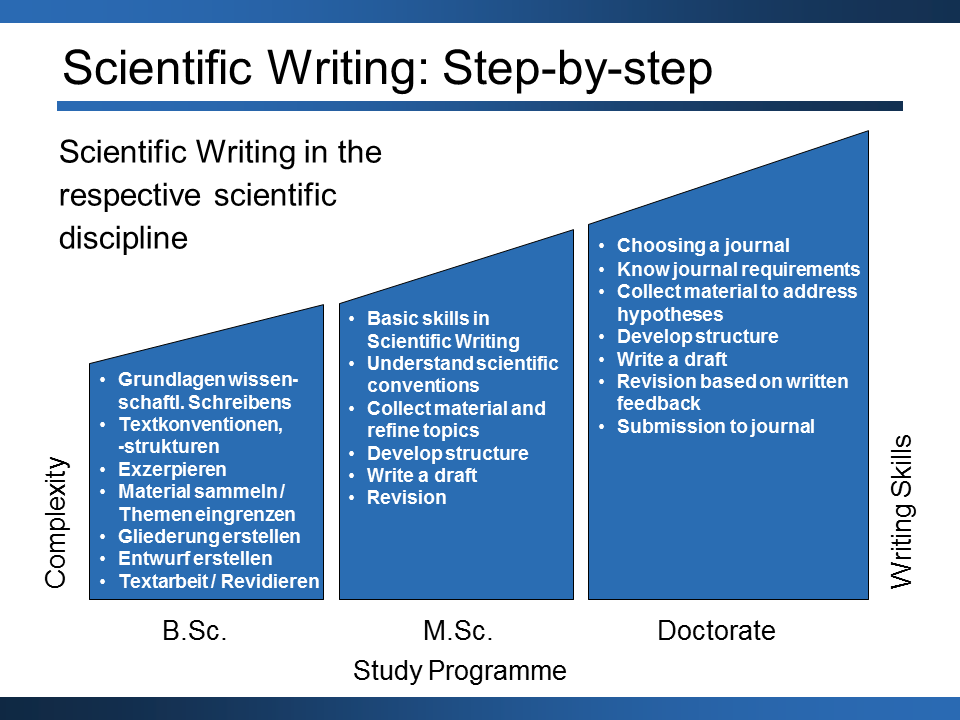Scientific writing
Introduction
During their studies students are frequently required to author written scientific work, such as lab reports, project reports, Bachelor's and Master's theses and scientific publications. This requirement increases with the level of studies (see the graph and external pagePaschke et al. 2011call_made).
Source: D-USYS, IAS, Grassland Sciences
Integration into the curriculum: Examples
Many ETH Bachelor's and Master's programmes include training in scientific writing. They link their respective disciplines to this skill in various ways. Taking examples from the ETH course range, we list some of the types of scientific writing pedagogy currently on offer.
The rules and conventions of scientific writing should be communicated early and often. This should preferably happen during subject teaching, because then concepts and requirements specific to the discipline may be incorporated.
Scientific writing is integrated into subject teaching at Bachelor's and Master's level.
Example: Bachelor's and Master's in Agricultural Sciences (D-USYS)
Course 1:
Buchmann, Grassland systems (D-USYS, BSc Agricultural Sciences)
Brief description: In this course students become familiar with important grassland systems and their ecological characteristics from a global perspective, learn to roughly estimate and assess the various influences and material conversion processes in grassland systems in different climates, and become able to work with the subject literature, write up a scientific argument or interpretation, and present their results in plenum.
Teaching and learning form: Seminar, independent written work
Scope: 2 hours per week, 2 credits
Contact:
Course 2:
Bugmann et. al., Global Change Biology (MSc Agricultural Sciences)
Brief description: This course focuses on the impacts of global change on forests and agro-ecosystems which will strongly affect sustainable resource use across the 21st century. Students learn to present scientific information to a scientific audience by preparing an executive summary and an oral presentation in answer to a specific scientific question. Students receive extensive feedback from teachers and peers, and in turn learn how to give constructive feedback to peers.
Lehr-/Lernform: Seminar, independent written work, peer-to-peer-feedback
Scope: 2 hours per week, 2 credits
Contact:
Degree programmes offer courses on scientific writing which are tailored to the specific requirements of the respective discipline and degree programme.
Example: D-ITET
Leuthold, How to Write Scientific Texts in Engineering Sciences (D-ITET, six Master's degree programmes)
Brief description: The course covers the basics of writing and presenting a scientific text. The focus is on the structure and elements of a scientific text and not on the language. Citation rules, good scientific writing practice and an overview of software tools are covered. The lecture takes place on two afternoons, with some exercises built in.
Teaching and learning form: Lecture, exercises
Scope: 2 x 2 hours, 0 credits
Contact:
Example: D-MAVT
Brändle/Paschke, Ingenieur Tools IV: Wissenschaftliches Schreiben [Engineering Tools IV: Scientific Writing] (D-MAVT, BSc Mechanical Engineering)
Brief description: The course presents scientific writing as a core competence in communicating with various target groups. Students become familiar with important methods and tools and learn how to apply them by identifying an issue; researching, assessing, citing and paraphrasing the necessary information; and planning and writing texts.
Teaching and learning form: Short presentations, exercises (in Moodle, using case studies), feedback and discussion
Scope: 3 half-days, 0.4 credits
Contact:
An instructor from the Language Center of UZH/ETHZ offers a course in cooperation with a department.
Example: D-BAUG, Master's thesis
Milligan, Writing an MSc Thesis in Environmental Engineering or in Geomatics (D-BAUG, MSc Environmental Engineering and MSc Geomatics Engineering)
Brief description: The course covers the conventions of academic writing; the structure of scientific MSc theses; a range of techniques for ensuring that texts are written clearly and coherently; relevant grammatical issues; and essential areas of vocabulary. The courses integrate a detailed reading of model texts selected for their individual relevance. Each lesson comprises specialist input, individual tasks, and pairs. By the end of the course, participants are able to plan their Master's theses section by section; structure information and argument clearly and concisely at the paragraph and sentence level; control language to meet the conventions and expectations of the target readership; present and discuss data, including figures, diagrams, etc.; avoid common errors of grammar and vocabulary; and edit their own drafts.
Teaching and learning form: Seminar, workshops
Scope: 5 x 4 hours, 1 credit
Contact: , Language Center UZH/ETHZ
Example: D-MATL
Mihalka, Writing for Publication in Materials Science, in cooperation with the Language Center (for D-MATL doctoral students)
Brief description: Writing for Publication in Materials Science is a short course designed to help junior researchers develop the skills needed to write their first research articles. The course deals with topics such as
- identifying target readerships and selecting outlets
- managing the writing process efficiently
- structuring the text effectively
- producing logical flow in sentences and paragraphs
- editing the text before submission
- revising the text in response to reviewers’ comments
Teaching and learning form: Workshops
Scope: 5 x 4 hours, 2 credits
Contact:
An instructor offers a course for students from different degree programmes and disciplines.
Example: D-GESS
Wenzel, Schreiben für andere - Wissenschaft und Öffentlichkeit [Writing for others - Science and the public] (GESS, Science in Perspective, for Bachelor's and Master's degree programmes, MA in the History and Philosophy of Knowledge)
Brief description: Practical exercises in writing articles for the feature pages of newspapers are combined with theoretical work on topics relevant for the historical, sociological and philosophical aspects of writing for others. Talks, articles and a book provide the sources for writing exercises. (Talk attendance is integrated into the seminar programme.)
Teaching and learning form: Lecture, discussion
Scope: 2 hours per week, 2 credits
Contact:

